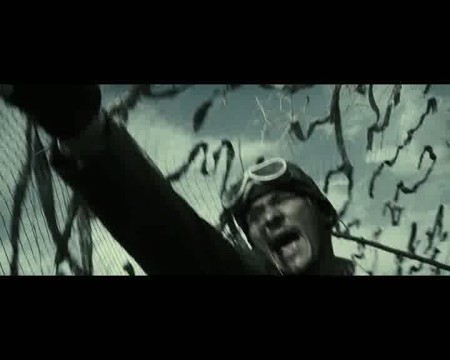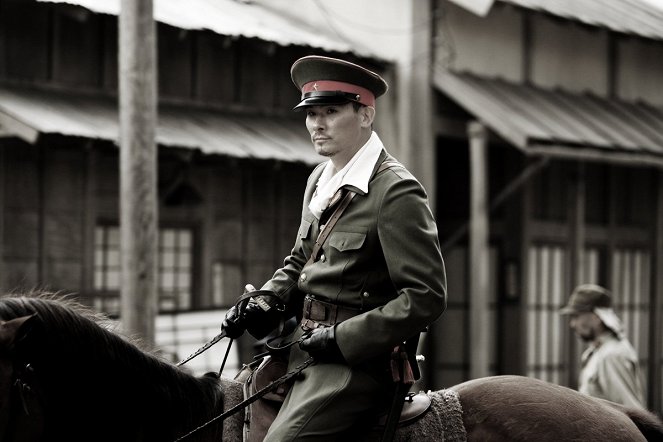Directed by:
Clint EastwoodScreenplay:
Iris YamashitaCinematography:
Tom SternCast:
Ken Watanabe, Kazunari Ninomiya, Tsuyoshi Ihara, Ryō Kase, Shidō Nakamura, Takumi Bando, Yuki Matsuzaki, Takashi Yamaguchi, Nae Tazawa, Lucas Elliot Eberl (more)VOD (3)
Plots(1)
Letters from Iwo Jima is based on the book 'Picture Letters from Commander in Chief' by Tadamichi Kuribayashi. The island of Iwo Jima stands between the American military force and the home islands of Japan. Therefore the Imperial Japanese Army is desperate to prevent it from falling into American hands and providing a launching point for an invasion of Japan. General Tadamichi Kuribayashi (Ken Watanabe) is given command of the forces on the island and sets out to prepare for the imminent attack. General Kuribayashi, however, does not favour the rigid traditional approach recommended by his subordinates, and resentment and resistance fester among his staff. (Warner Bros. Home Entertainment)
(more)Videos (2)
Reviews (9)
Letters from Iwo Jima is a nice film. The Japanese view of the incident is darker, more accomplished and more meditative than the American view depicted in Flags of Our Fathers. And, mainly, it works internally. The spectacular action scenes are all the more impressive due to the fact that there is a minimum of them and we see them only from a distance, thanks to which the film maintains a powerfully intimate nature. The sentiment and simplicity are tastefully balanced with a beautiful visual aspect and the minimalism of Clint Eastwood’s music, whose dominant feature is a fragile piano motif. Another pleasing aspect is the filmmakers’ affection for the Japanese and, in contrast to that, their contempt for the American soldiers in some scenes. It’s a shame that Flags is such an unworthy sibling to Letters and drags this ambitious diptych of films down to the level of a quickly thrown-together Oscar frontrunner. If more work had been put into Flags, these two films could have gone down in history together.
()
Clint Eastwood is an experienced and highly professional craftsman of American film studios and I don't think he has ever disappointed me with any film, but none of his movies have really made me excited, either. He usually represents a safe bet, as he is disciplined but mostly predictable. I'm not saying that Letters from Iwo Jima is a bad war film, I just feel like more could have been extracted from the given material. The most intense battles on the Pacific front took place on this island, where strength crushed strength and determination clashed with determination, and considering how intense that battle was, I didn't really see much of that excitement in the film. The execution scene of two Japanese prisoners was perhaps the only surprising and cinematically enjoyable moment; otherwise, Eastwood's journey into World War II history left me rather indifferent emotionally. Overall impression: 60%.
()
I enjoyed this film very much. For me, it’s a completely different take on the exhausted topic of the Second World War, this time from the "opposite" side of the barricade, that does not carry the stars on the flag or bulletproof democracy. The Japanese are portrayed as a proud people who would rather fall to their last man than surrender their territory and, more importantly, their lives to an arch-enemy, which is very much reflected in the film overall. Eastwood conceived the battle of Iwo Jima in part as a probe into the souls of these determined soldiers, as evidenced by the battle sequences that keep a powerfully palpable dramatic face throughout. We gradually get very close to the protagonists, as if we were standing right next to them and crouching with them, hidden from enemy fire. I really felt sorry for those quite nice people who had to retreat step by step in the face of the ruthless American advance, and preferred to voluntarily put their lives on the lines in order to preserve their honour. Clint did a great job, with feeling and with all the life experience he has gathered throughout his life, and I have no choice but to bow in recognition. BRAVO, MAESTRO!
()
My next encounter with war Eastwood, where the director once again shows that he is much closer to a human story than capturing war. He is not trying to make a great war film, but a great drama. I simply cannot forget some scenes from the movie. The scene with the dog, touching and harsh at the same time, Japanese fanaticism, which ends in mass suicide with a lot of grenades, a bucket of excrement, which means the difference between life and death. Even in war, there is room for happiness. An excellent film that surpassed its doppelgänger "Flags of Our Fathers". I admire Eastwood for not shooting in English, but in the right language, just like Mel Gibson did in "Apocalypto" or "The Passion of the Christ". That's how it should be. And not like the case of the film "The Girl with the Dragon Tattoo", which is great in the American version, but why the hell is it set in Sweden when the characters speak English anyway? More: http://www.filmovy-denik.cz/2012/04/diar-milovnika-filmu-c-0003-eastwood.html
()
I don't understand how this Clint Eastwood war flick completely flew under my radar. It is a very decent affair from the viewpoint of the Korean people, where Clint beautifully shows that not all the soldiers were fanatics of the Emperor, but there were people with hearts who felt fear. The film has decent war scenes with no shortage of gore and features some very powerful moments (the shooting a family's dog and a mass sacrifice). 85%.
()



Ads